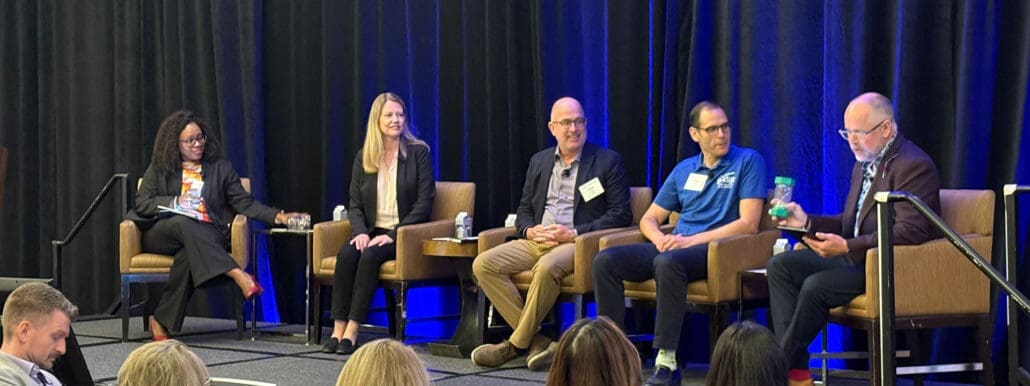Travel Leaders Network’s Business Travel Center of Excellence conducted their annual Conference in Chicago this year. The Executive Forum was attended by nearly 100 agency owners, their staff, clients, prospects and Travel Industry Suppliers. Travel industry experts reviewed a wide range of topics relevant to the status of the travel industry, including workshops and discussions about AI and where it fits into travel, and how airlines are adapting to challenges in their business. Here are some of the Key Learnings & Outputs from the conference.
Business Travel 2030: Adapting Policy for a New Era
With geopolitical change, shifting workforce demographics, the advancement of AI, revolutions in connectivity and distribution and more, business travel is set to evolve further in the next five years than it has in the previous 67. The question is straightforward: how will travel managers, suppliers, and organizations adapt, develop and evolve to be ready for Business Travel 2030?
 The Forces Shaping Business Travel 2030
The Forces Shaping Business Travel 2030
The Executive Forum discussions underscored a shared recognition: business travel is entering an accelerated phase of change. Drawing on insights from The Hundred project, supplier perspectives, airline leaders, ground transportation providers and Gen Z travelers, several defining forces emerged:
- Geopolitical instability and shifting demographics will reshape travel flows and priorities.
- Artificial Intelligence is moving from experimental pilots to enterprise-wide integration.
- Distribution and content remain fragmented, with urgent calls to fix the ‘pipes and plumbing.’
- Traveller expectations, especially from Gen Z, will demand baseline connectivity, comfort and alignment with values.
- Sustainability pressures are intensifying, with skepticism around current progress toward net-zero targets.
 Inclusivity and Duty of Care
Inclusivity and Duty of Care
One of the strongest messages from the Forum was that inclusivity is not optional. As Ian Jones framed it: “One in four travelers has a disability visible or invisible. Getting comfortable with the uncomfortable is really important.”
Michael Covey (United Airlines) stressed the power of self-disclosure: “If people can self-disclose, we can actually have the right resources at the right time for the right customers.” Kate King (International SOS) illustrated how preventive safety training, such as preparing LGBTQ+ travelers for cultural risks, can transform outcomes. Linda Bekoe (About Partners) cautioned, “Inclusivity should not be a token. It needs to be a standard.”
 Artificial Intelligence and Technology Integration
Artificial Intelligence and Technology Integration
AI featured heavily across sessions, from airlines to booking platforms. Kim Ahearn (United Airlines) outlined its role in forecasting, disruption management and efficiency: “The people are what make United … AI frees up our people to be people.” Shrikanth Mysore and Shannon Murphy (Travelport) showcased how conversational AI can rebook disrupted journeys instantly. Yet, as one supplier put it within temoji’s The Hundred interviews, “AI’s potential is massive, but it needs amazing data. We’re not there yet.”
 The Gen Z Traveller
The Gen Z Traveller
Hunter Weber (United Airlines), in his TL-x Talk, brought the Gen Z perspective to life, said, “What’s luxury today is baseline tomorrow.” By 2030, Gen Z will make up one-third of all travelers, and their expectations are already reshaping programs. For Gen Z, seamless connectivity, comfort and alignment with values are non-negotiable. As Weber explained: “Price matters, but values matter more.” Programs that fail to demonstrate sustainability and inclusivity for their Gen Z travelers risk losing employee and associate loyalty.
Traveler Satisfaction as ROI
Erika Beaucage (Enterprise Mobility) reinforced that traveler happiness is not a soft metric but a measurable driver of ROI: “When you have happy people that enjoy what they do, that projects onto your customers.” Enterprise’s strict duty of care standards, monthly customer surveys and employee empowerment to “make it right on the spot” are embedded in its culture. As Beaucage emphasized, “Happy travelers are productive travelers. Happy employees deliver happy travelers. And when satisfaction improves, so does ROI.”
 Ground Transportation and Compliance
Ground Transportation and Compliance
Robert Mendoza (Blacklane) presented new YouGov research that showed 78% of travelers know their company’s travel policy, yet compliance remains poor. “Policies exist. Compliance doesn’t. Awareness does not equal action,” he stated. The consequences are financial and operational. Mendoza illustrated that leakage in ground transportation alone can cost companies tens of thousands in lost productivity per executive per year. His call to action: “Compliance isn’t about control; it’s about creating programs that travelers actually want to follow.”
Building for Business Travel 2030
The closing design-thinking exercise challenged delegates to ideate how policies must evolve for 2030. Outputs clustered around several priorities:
- Embedding AI-driven compliance and communication tools.
- Designing traveler profiles that integrate preferences, health and duty of care data.
- Enhancing distribution transparency through new booking technologies and partnerships.
- Building sustainability visibility directly into booking decisions.
- Redefining ROI to include cultural, people, and environmental outcomes.
As one delegate summarized from a group work session at the event: “Communication is the foundation. Without communication, nothing else on here matters.”
Toolkit: Starting the Journey to 2030
To translate insights into action, travel managers and franchisees can begin with the following steps:
- Audit inclusivity and accessibility across your program. Identify and address gaps in design, communication and supplier practices.
- Pilot AI-driven solutions in disruption management, compliance monitoring and traveler support.
- Engage Gen Z voices within your teams to shape travel programs for the next decade.
- Reframe compliance as value by simplifying tools, integrating loyalty and rewarding behavior.
- Embed sustainability at the point of sale with visible CO2 data and enforceable standards.
- Track traveler satisfaction as a business KPI, linking happiness directly to ROI.
- Rethink partnerships to prioritize transparency in distribution and content.
Conclusion
Business travel is at an inflexion point. The insights from the Executive Forum sessions demonstrate both the scale of the challenge and the opportunity. To be Business Travel 2030-ready, organizations must act with urgency, embedding inclusivity, technology, sustainability and traveler satisfaction at the heart of policy. As Ian Jones challenged: “Business travel may evolve more in the next five years than it has in the last 67, since the first scheduled transatlantic jet flight. How will you adapt, develop and evolve to be ready?”








 The Forces Shaping Business Travel 2030
The Forces Shaping Business Travel 2030 Inclusivity and Duty of Care
Inclusivity and Duty of Care Artificial Intelligence and Technology Integration
Artificial Intelligence and Technology Integration The Gen Z Traveller
The Gen Z Traveller Ground Transportation and Compliance
Ground Transportation and Compliance